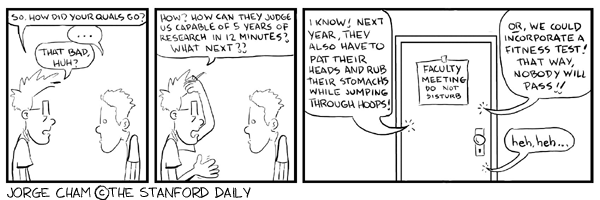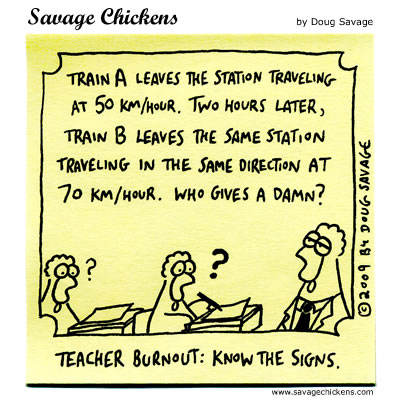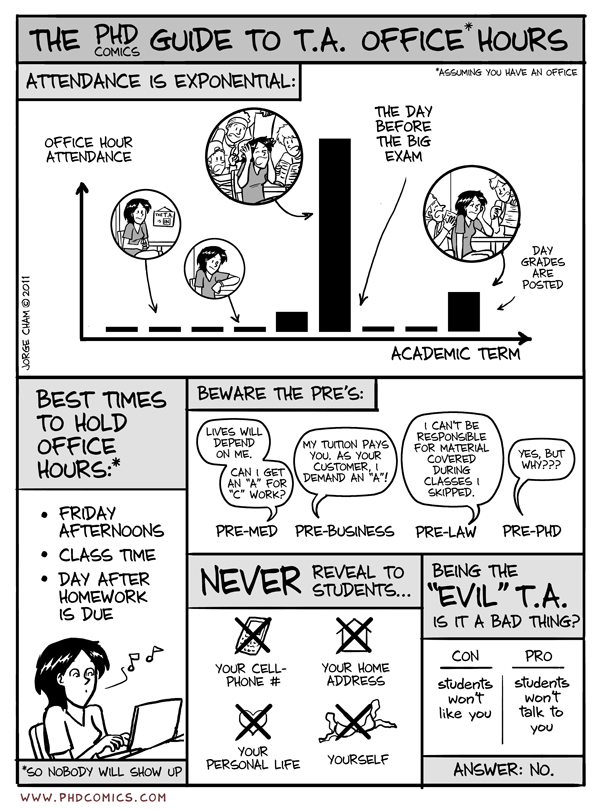First off, graduate school does make you feel stupid. Part of this level of education is not taking regular classes but having them as seminar or discussion - to integrate advanced topics and reasoning. Prepare as you will, the professor will always lead the discussion in a way that you never thought of and there's always someone else that says something profound (well, it's not always actually profound, but you're little brain makes it feel that way). You'll find yourself scrambling to write down every word and still walking away only half following what the hell just happened. This mixes very interestingly with the societal pressure to cut the tall weeds (aka it is often socially unacceptable to be the really really smart one) and the academic pressure to weed out the scrubs (aka figure out who really doesn't know much). Most new students are too afraid to say anything, afraid to sound stupid or to come across like they are "attacking" another idea. So you sit, smile, and nod your head.

Of course, this doesn't last. Here in my 3rd year of my PhD I find myself participating more often, especially in classes or seminars with a large proportion of graduate students. Still keep pretty pursed lips though in large scale settings with lots of faculty. I'm not really a shy person, but what do you do? Just try.
Now onto the comps piece. We talked a little bit about this before but for the conversation to continue we all need to be on the same page. For a PhD student, the only way to move from "student" to "candidate" (aka even be considered for grants or graduation) is to take comprehensive exams. This differ from department to department and school to school. Usually there's a mixture of written and oral exams. Some use a mock grant proposal and defense. Others use large scale tests. My department has a week of essay papers for the written. Each day a different committee member (minimum of 5, and trust me that's ALL you need) will send you a set of questions each day. They will require you to produce facts from papers you have read as well as extrapolate and apply them to the questions. Assuming you pass these there is a day of orals, whereby you sit in front of your committee and for 4-6 hours they verbally ask you questions.

Okay, enough on that drama for now. I am more than sure as they approach and I sink in deep for survival there will be more on that. The point of that conversation is to move it further. Another student in the department (with another adviser) was telling me horror stories of her first failure and her second try (you only get 2) in which she passed. She told me one of the biggest differences was attitude. She's a smart cookie and going into her first one felt confident. Responding to this her committee became very aggressive and would outwardly tell her that they didn't like whatever thought process she had followed to get to an answer, even if it wasn't technically wrong. Afterwards her adviser berated her for her performance, leading her to almost quit.

Thankfully she didn't quit and when she tried again she went in with her head down. She was still able to think through answers but by being less confident she got more positive responses and received much less aggression from her committee (plus she passed). Now take any story with a grain of salt but it seems to me that part of the point of comprehensive exams is to show you how much you DON'T know (or can't know YET) and look for you to show signs of humility and "absolute" stupidity. Keeping in mind of course that these exams also look for you to prove you do know the basics in your field and would be a respectable representation of it (not "relatively" stupid).
This brings us to the paper I mentioned at the beginning of this conversation. The author actually teases at my assessment above, stating if a student is able to answer all the questions posed to the fullest it is the committee that failed the exam. By that feeling of absolute stupidity it pushes us to question and inquire, to keep moving beyond the bounds of current knowledge to learn and regain the feeling of shock and awe at the complexity of the universe. If we ever feel like we know anything, then we stop learning and stunt the learning of those around us. In the universe of science, you shouldn't feel like you know what you're doing because that's what leads to the big discoveries. So feel absolutely stupid but know that you're not relatively stupid. You know a lot, but you can't know everything!
Check out the article. It's a well written essay that is easy to follow, even if you don't get into science itself per se.
Swartz, M.A. 2008. The importance of stupidity in scientific research. Journal of Cell Science 121: 1771.
http://jcs.biologists.org/content/121/11/1771.full.pdf+html-
Let me know what you think or share related experiences. Your story can only lead to inform others coming through and make those who have felt it feel less alone.
"Do not be afraid of defeat. you are never so near victory as when defeated in a good cause" Henry Ward Beecher
 (ps does anyone else think this button looks less than adorable and innocent?!)
(ps does anyone else think this button looks less than adorable and innocent?!)








